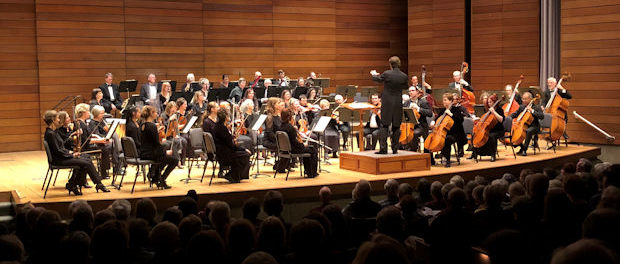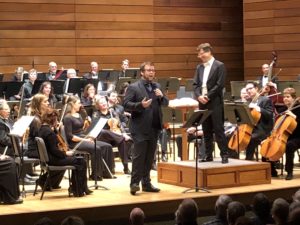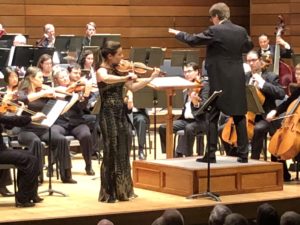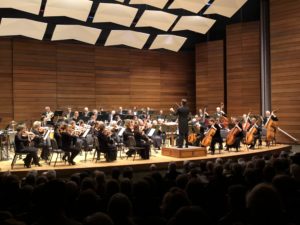RVS 2017-2018 Masterworks 3
 Music Director Martin Majkut leading Rogue Valley Symphony in a performance of Felix Mendelssohn’s Symphony No. 5 “Reformation” during the Masterworks 3 concert at SOU Music Recital Hall, Ashland, OR on Nov. 10, 2017
Music Director Martin Majkut leading Rogue Valley Symphony in a performance of Felix Mendelssohn’s Symphony No. 5 “Reformation” during the Masterworks 3 concert at SOU Music Recital Hall, Ashland, OR on Nov. 10, 2017
Chef Majkut Whips Up a Love Feast with Three Rare Treats as Rogue Valley Symphony Continues Its 50th Anniversary Season
– by Lee Greene
This weekend, (Nov. 10, 11 & 12, 2017) Rogue Valley Symphony (RVS) is presenting the third concert series (Masterworks 3) of its 50th Anniversary season, a trio of concerts featuring “one of the hottest violin soloists on the scene today”, Bella Hristova. When Ms. Hristova last performed with the RVS, in October 2014, I described the event in culinary terms and cast Music Director Martin Majkut as the gifted head chef. ( You can read that earlier review here: http://bit.ly/1LlJS4J ) That analogy fits just as well for the current concert series.
What Chef Majkut has prepared for his guests this weekend is the musical equivalent of a $1000 a plate culinary heirloom banquet featuring normally impossible to find rare, savory treats – once in a lifetime dishes, but RVS serves it up to its audiences for as little as $15 a seat. [Get tickets here: http://rvsymphony.org/buy-tickets/ or call the RVS Box Office at (541) 708-6400.]
Let’s start with the main dish, the piece featuring violin soloist, Bella Hristova. Ms. Hristova had wowed audiences here when she appeared in October 2014 and played Prokofiev’s Violin Concerto No. 1 (“Ms. Hristova was superb . . . executing fast moving passages and playing at the high range of her instrument flawlessly, while conveying all of the intense passion that Prokofiev had invested in this piece” http://bit.ly/1LlJS4J ) Ms. Hristova, who was near the top of her profession three years ago when RVS snared her for performances here has risen even higher over the interim, in her skills, accomplishments and acclaim. As noted at the beginning of three pages of notes in the printed concert program expounding on the bona fides of Ms. Hristova:
“Acclaimed for her passionate, powerful performances, beautiful sound, and compelling command of her instrument, violinist Bella Hristova is a young musician with a growing international career. The Strad has praised, ‘Every sound she draws is superb,’ and The Washington Post noted that she is ‘a player of impressive power and control.’”
Having heard her perform again at Friday night’s (11/10) RVS concert, I would not argue with those assessments, except to point out that they may be a bit of understatement. For anyone who fancies classical music, especially music featuring the violin, it doesn’t get any better than Bella Hristova and her performances in this concert series. Ms. Hristova’s appearance as the soloist in these concerts is reason enough to push everything else aside and find a way to get to one of these concerts. And I haven’t even yet begun to address the unique and singular virtues of the piece she played and her performance of it.
In the intervening time since Ms. Hristova last performed here and enchanted audiences, she has married – to the extraordinarily gifted, successful, acclaimed, and much in demand young classical composer, David Ludwig. Mr. Ludwig gets three pages of laudatory notes of his own in the printed concert program, and has written well received works for, and performed by, many prominent artists and orchestras including the Philadelphia, Minnesota, Pittsburgh and National Symphonies. After the marriage of the consummate violinist to the gifted composer, a consortium of eight symphony orchestras (including RVS), who were familiar with the artists, commissioned Mr. Ludwig to write a new work, but not just any manner of work, but a violin concerto. The orchestras hired composer Ludwig to write a concerto for his wife! Mr. Ludwig said this about composing his violin concerto:

Composer David Ludwig addressing audience after being introduced by Maestro Martin Majkut, and discussing his violin concerto, about to be played by the Rogue Valley Symphony during the Masterworks 3 concert, Ashland, OR, Nov. 10, 2017
“I started working on my violin concerto right around the time I got married with Bella Hristova, who (without coincidence) is the violinist I wrote the piece for. I only know of a few concertos written by composers for first performances by their spouses, and I don’t know of any that are motivated by the idea of marriage itself, as this one is. My concerto comes with musical references to partnership, empathy, and communion, as it imagines the before, during, and after a traditional wedding ceremony.”
Before the work was performed in the concert, Mr. Ludwig spoke to the audience and told them that his concerto was divided into 3 parts: The first movement, Dances, is very dark and sad, as the couple have not met yet and are wandering around alone and loveless. In the second movement, Ceremony, the mood changes as they meet, develop a partnership and are married. In the third movement, Festival, the community surrounds and supports the couple and everyone parties as they celebrate the couple, relationships and love. At the risk of self-indulgence, I have to say, as a newly-wed myself recently going through that life progression, Mr. Ludwig has succeeded remarkably in accurately and beautifully capturing musically the moods and experiences of that key facet of life.

Violinist Bella Hristova performing David Ludwig’s Violin Concerto with Rogue Valley Symphony, directed by Martin Majkut, during the Masterworks 3 concert, Ashland, OR, No. 10, 2017
The work is an absolute musical treat. It is, in turns, delightful, elegant, pleasing and stunning. It not only presents jaw-dropping challenging virtuoso violin solo passages, but makes full and brilliant use of the entire orchestra. I am not usually at a loss for words, but Ms. Hristova’s performance of this piece pushes me awfully close. This work provided the most challenging, difficult, and magnificent violin solo passages I have ever seen/heard and I have seen a lot by numerous virtuosos. The work demands everything from the violin soloist – sweet little quiet passages, absolute command of the top of the instrument’s range, and precise skill playing an extended passage of compressed notes at an impossibly fast pace. It was a violin tour de force. And it was exceptionally well done by Ms. Hristova. Mr. Ludwig challenges the violin soloist in every way possible, and Ms. Hristova gloriously rises to meet and conquer every challenge. (If I ever had the temerity to demand that my new wife tackle something so difficult, with an auditorium full of observers, I think I’d be locked out of the bedroom for months. But the chemistry between Ms. Hristova and Mr. Ludwig is such that each apparently feeds energy and exuberance off of the other and mutually push each other to rarified new heights.) As noted already, Mr. Ludwig makes full use of the rest of the orchestra, and under Maestro Majkut’s direction, they rose to the challenge as well. The piece makes heavy use of tympani and percussion in a number of sections (for example, in the Dance section to underscore the dark mood) and the percussion section and timpanist Theresa McCoy were superlative in performing those passages. At several places, the piece includes dramatic swells from the brass and woodwind sections, which also comported themselves with aplomb. And the strings, oh the strings – the strings serve several vital roles in this work, for example they represent the bridesmaids during the ceremony in the Ceremony movement. If only every wedding could have bridesmaids so beautiful. The conclusion of the performance of the work was met with a much deserved, sustained, rousing, standing ovation by the audience, through multiple curtain calls and bows by Ms. Hristova, Maestro Majkut, composer Ludwig, and the entire orchestra.
RVS is the seventh orchestra of the eight commissioners to perform this remarkable, magnificent, delightful work. It has not been recorded. You can’t buy a recording anywhere. You can’t go somewhere else and catch just any other orchestra doing a performance of the piece. The only way you can hear this work is to drop whatever you’re doing and quickly get tickets to one of the remaining two RVS performances this weekend (Saturday, 11/11 at 7:30 pm and Sunday 11/12 at 3 pm) at the Craterian Theatre in Medford. (There is no performance in Grants Pass this weekend because of scheduling conflicts.)

Rogue Valley Symphony, directed by Martin Majkut, performing Hector Berlioz’s Overture to Béatrice et Bénédict during the Masterworks 3 concert, Ashland, OR, Nov. 10, 2017
But the commissioned violin concerto is only one dish in a complete meal served up by Maestro Majkut. With the main course settled, as Maestro Majkut thought about planning the other pieces to offer his guests, “I wanted to open the concert with a piece that celebrates how people fall in love. From the budding interest in someone to the moment when love spreads its magic wings over the enchanted couple, the path can be thorny—and also very entertaining to observe by bystanders.” He found what he was looking for in Hector Berlioz’s Overture to Béatrice et Bénédict. The opera is Berlioz’s effort to adapt Shakespeare’s play in operatic form. Berlioz biographer David Cairns has written: “Listening to the score’s exuberant gaiety, only momentarily touched by sadness, one would never guess that its composer was in pain when he wrote it and impatient for death.” [Béatrice et Bénédict, Wikipedia, http://bit.ly/2ySy3EE ] The opera is rarely performed, and the overture (which “alludes to several parts of the [exuberant, gay] score without becoming a pot-potpourri”, [Id.]) separately even less so. But this rare morsel perfectly serves the role Maestro Majkut was wanting to fill on his love feast concert menu, nicely warming the audience up for the violin concerto main course. Listening to the opening performance of this work, I found it lively, the performances by the various principals and sections tight, the brass especially crisp and clear. The piece progressively builds excitement and concludes with a rousing crescendo. In my concert notes I wrote “If you weren’t awake before, you would be now!” As seemingly always, with every concert, Maestro Majkut had found a suitable piece to begin the concert by showing off what the orchestra could do and providing all his musicians and sections with a worthy exercise to get them warmed up for the delights to follow.
After a brief intermission, Maestro Majkut concluded the program with the final dish of this extraordinary meal of rare musical works: Felix Mendelssohn’s Symphony No. 5 “Reformation”. The Reformation Symphony was Protestant religious convert Mendelssohn’s effort to celebrate an important anniversary of the Lutheran church. This now being the 500th anniversary of the October 1517 beginning of the Protestant Reformation by Martin Luther and separation of the Protestant Churches from the Roman Catholic Church, Maestro Majkut was wanting to celebrate that important milestone in this concert. But again, Symphony No. 5 is a very rarely performed work. A bit of explanation is in order. Mendelssohn, who was a hopeless perfectionist at heart, struggled over the composition of his Reformation Symphony and was met with a string of bad luck when composing it. [Symphony No. 5 (Mendelssohn), Wikipedia, http://bit.ly/2yrk6ZX ] He originally intended to complete it for a debut at a prominent Lutheran anniversary celebration in June 1830. But he became ill while working on the symphony, including catching a case of measles from his daughter, and was delayed in completing it in time for the intended debut concert. He subsequently offered the piece to several orchestras but was turned down with criticisms such as too learned or too Protestant. Faced with rejection and criticism, Mendelssohn revised the symphony, but eventually abandoned it, writing it off as “a piece of juvenilia.” [Id.] It was only performed once in Mendelssohn’s lifetime and wasn’t published until after his death. Mendelssohn dismissed the symphony (which by the way was the second he wrote, and is numbered 5 only because of its late posthumous publication), once saying it was the one score he wished he could destroy. It has received similar treatment through the ages by generations of musicians, orchestras and audiences, which is a shame, because it is a fine symphony. It both incorporates and pays reverence to the musical liturgy of the Protestant Churches and also presents some terrific original exemplars of the symphonic form that are purely Mendelssohn’s own.
The first movement of the symphony opens with the well-known four-note theme (transposed) of Mozart’s Jupiter finale, which sets a serious, dignified, “historical” tone as it leads to the Dresden Amen, a composition familiar to church goers, both Protestant and Catholic. The fourth movement honors Martin Luther and is built upon Luther’s beloved hymn Ein’ feste Burg is unser Gott (A mighty fortress is our God). The second and third movements are quintessential Mendelssohn implementations of the symphonic form (written only two years after the death of Mendelssohn’s hero, Beethoven).
Again, at the risk of seeming self-indulgent, I have to observe, as a practicing, church going Presbyterian Protestant, I am familiar with the church musical liturgy Mendelssohn was seeking to recognize and honor in his Reformation Symphony and I found his adaptation of the church music moving, enjoyable and memorable. Of course, Maestro Majkut had his orchestra well prepared to perform this rare piece, which I doubt many of them had seen before. All sections of the orchestra performed admirably. My notes contain special kudos for the flutes (Katheryn McElrath and Debra Harris), who in a few passages stood out in the best possible way. I could go on prattling about the performances by the musicians and orchestra and incomparable direction of Maestro Majkut, but it would be better for you to listen and see for yourself – so here is a two minute video excerpt of the conclusion of the fourth movement of the November 10, 2017 Ashland performance of Mendelssohn’s Symphony No. 5 “Reformation”:
At the conclusion of the concert, the audience left, fully satisfied, content, and happy, with the musical meal they had just enjoyed as prepared by Maestro Majkut. As mentioned above, these were rare and remarkable pieces and performances, which should be caught while you have the opportunity to do so. The program will be repeated twice more, at 7:30 pm on Saturday, Nov. 11 and at 3 pm on Sunday, Nov. 12 at the Craterian Theatre in Medford. If you have any opportunity to attend one of these remaining performances, do it! You’ll be glad you did, and you’ll have missed a glorious musical feast if you don’t.
To get tickets to remaining RVS concerts:
Box Office Phone: 541-552-6398
Email: tickets@rvsymphony.org




